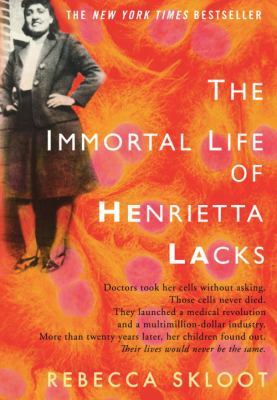
I don't read a lot of non-fiction, but The Immortal Life of Henrietta Lacks by Rebecca Skloot is my kind of non-fiction. Educating, but entirely engrossing. Skloot weaves a story instead of just laying down the facts. Henrietta Lacks was a poor black woman in Baltimore who died in the early 1950s of ovarian cancer when she was 31. As was a common practice in the 1950s, a doctor took a tissue sample from Henrietta -- one of healthy cells and one of her cancerous cells -- for research. A biologist at Johns Hopkins was attempting to grow cells in culture and asked the doctor for part of the sample for his research. Henrietta's cells -- dubbed HeLa -- did what none of the scientist's cells had done before. They survived, and they grew, and they thrived. They made it possible for scientists to experiment and conduct studies on live human cells, paving the way for amazing advances in medical and scientific research -- from the polio vaccine, to a multitude of medications. Her cells have been in space and have been blased with a nuclear bomb.
But what Skloot does is give you a context beyond just research and science -- she tells you the story of Henrietta and her family. She takes you to a small tobacco farm in Virginia, and to the streets of Baltimore. She shows how Henrietta's death affected her family, while her immortal cells were simultaneously affecting the whole world.
In some ways, The Immortal Life of Henrietta Lacks is controversial, because readers are presented with ethical issues of tissue rights and informed consent. Who should or should not profit from tissues taken from a person's body? Who should have say over what research is done with a person's tissue? In an age of genetic research, what are the implications to people's privacy? Race, poverty, education, healthcare, medical reasearch, ethics, and faith are all themes that run through this book. However, Skloot skillfully weaves all of this into a wonderful, fair, and very informative narrative. I learned something, I was outraged, I was inspired, I may have teared up a bit at one point, and I was most of all interested until the last page.
Bottom line: if you like biographies, history, or science and narrative non-fiction, pick up this book.
No comments:
Post a Comment